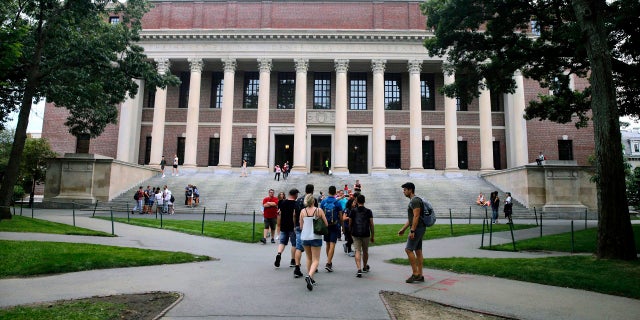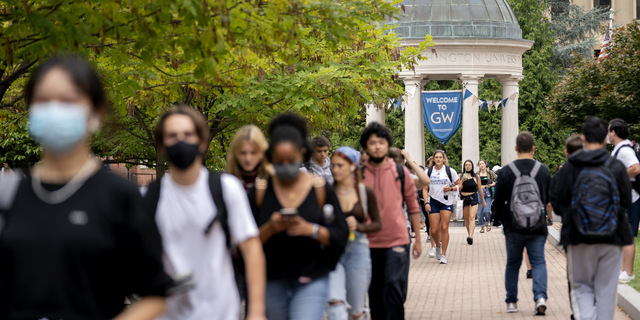A growing number of education and universities in America have announced a remote start to the spring semester due to a rise in new infectious-disease cases and a new variant.
Citing the new omicron variant, which recently became the dominant variant of the coronavirus in the United States, many universities are telling students to push back their plans of returning to campus and begin their classes online.
George Washington University, Columbia University, Duke University, University of Illinois Urbana-Champaign, Temple University, University of California at Los Angeles, University of California at San Diego and the University of Washington have all announced they will begin their spring semester remotely, adding to the already growing number of colleges and universities taking similar measures.
George Washington University President Thomas LeBlanc and other officials announced on Tuesday that the spring semester would begin remotely in January, with “full in-person operations” resuming on Jan. 18.
“At this time, we plan to begin the spring semester virtually to allow for a gradual and careful in-person return to campus. We anticipate that this will be a temporary adjustment, and we are projecting that full in-person operations will resume on January 18, following the Martin Luther King, Jr. holiday,” the announcement said.
UNIVERSITIES CLOSING OVER OMICRON VARIANT MAKING MISTAKE, MEDICAL EXPERT SUGGESTS

Philadelphia, USA – May 4, 2015: Temple University building in Philadelphia, Pennsylvania, USA. (iStock)
The university officials pointed to an increase in coronavirus cases “fueled by the omicron variant” as the reason for making the decision to begin the spring semester remotely.
Additionally, the university officials announced that the deadline for all eligible returning community members to receive the coronavirus booster shot and provide documentation has been adjusted from Feb. 1 to Jan. 10.
George Washington University student Patrick Burland told Fox News that he’s fearful that his university will end up extending the amount of time that classes are remote.
“The administration isn’t setting any benchmarks. The language they’re using is reminiscent of the bait and switch they pulled last fall, but I hope I’m wrong and that GW will allow students to attend in person classes,” Burland said.
The University of California at San Diego is moving to a “remote-only mode” of classes from Jan. 3 through Jan. 17, and will use that period of time to “incrementally populate the campus using a more comprehensive testing regimen,” according to an announcement.
Duke University is planning to hold remote classes from Jan. 5 through Jan. 8, and in-person classes are expected to return on Jan. 10.
HARVARD UNIVERSITY ANNOUNCES REMOTE CLASSES FOR MOST OF JANUARY DUE TO RAPID RISE IN OMICRON CASES

In this Aug. 13, 2019 file photo, students walk near the Widener Library in Harvard Yard at Harvard University in Cambridge, Mass. The Ivy League school announced Monday that as the coronavirus pandemic continues its freshman class will be invited to live on campus this fall, while most other undergraduates will be required to learn remotely from home. (AP Photo/Charles Krupa, File)
At Temple University, classes will be conducted online through Jan. 21, with some exceptions, according to an announcement.
Harvard University announced on Saturday that students will study remotely for the first three weeks of January, citing the “rapid rise” in coronavirus cases.
The Harvard University administrators wrote that the decision to shift classes online was made with “the health and safety of our community as our top priority.”
Faculty, staff, and researchers are encouraged to work remotely for the first three weeks of January.
CLICK HERE TO GET THE FOX NEWS APP

Students on campus at George Washington University in Washington, D.C., U.S., on Thursday, Sept. 9, 2021.
(Stefani Reynolds/Bloomberg via Getty Images)
Stanford University also announced a remote start to their spring semester, with classes being held online for the first two weeks of the winter quarter. According to the announcement, in-person instruction will resume on Jan. 18.
Dr. Marc Siegel, Fox News medical analyst and professor of medicine at New York University Langone Medical Center, said that universities are making a mistake by moving to remote learning.
“Since it’s a university, if you look at it completely medically, it’s a built-in quarantine situation,” Dr. Siegel said. “What do you got at a university? The ability to quarantine people, the ability to study a whole population, the ability to rapidly test everyone, the ability to make sure everybody is vaccinated.”









